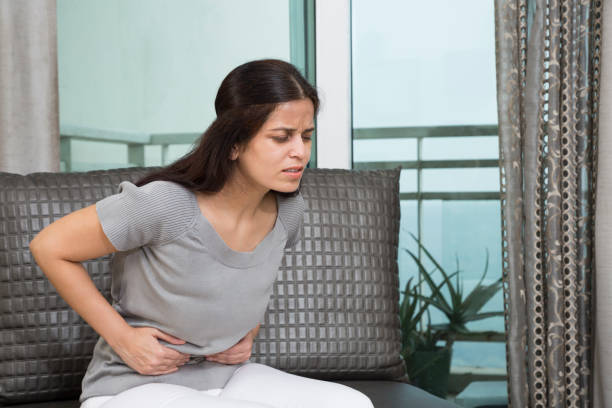Polycystic Ovarian Syndrome (PCOS) is a common endocrine disorder affecting women of reproductive age. It is characterized by a state of hyperandrogenism and chronic anovulation. The condition is marked by the presence of multiple cysts in the ovaries, which can be seen in about 20% of normal women. In this blog, we will discuss the clinical features, diagnosis, and management of PCOS.
Clinical Features of PCOS
PCOS is associated with a wide range of clinical features. Some of the common clinical features include increased obesity, menstrual abnormalities such as oligoamenorrhea, amenorrhea, and dysfunctional uterine bleeding. Women with PCOS may also experience infertility, hirsutism (thick dark hair over face, neck, chest, tummy, low back, thighs), acne problems, and acanthosis nigricans (skin changes due to insulin resistance). The skin is thickened and pigmented (grey brown) in the commonly affected sites such as the nape of the neck, inner thighs, groin, and axilla.
Diagnosing Criteria of PCOS
The clinical diagnosis of PCOS is based on the presence of any two of the following three criteria: oligo/anovulation, hyperandrogenism, and polycystic ovaries. In addition to these, the diagnosis of PCOS can be confirmed by the following diagnostic criteria:
- Menstrual abnormalities
- Hirsutism
- Obesity
- Hyperandrogenemia
- Elevated plasma LH/testosterone
- USG-pco (greater than 10 cysts 2-8 mm in diameter)
Management of PCOS
The management of PCOS involves a combination of authentic Panchakarma treatments, weight reduction, exercise, yoga therapy, and diet and nutrition therapy. Here are some tips for managing PCOS:
Authentic Panchakarma Treatments:
Ayurveda offers authentic Panchakarma treatments that help to restore the balance of the doshas and improve the overall health of the body. Some of the Panchakarma treatments that can be beneficial for women with PCOS include Virechana (medicated purgation therapy), Basti (medicated enema therapy), and Abhyanga (Ayurvedic massage therapy).
Weight Reduction:
Weight reduction is an essential part of managing PCOS. Women with PCOS are often overweight or obese, and losing weight can help to reduce the severity of their symptoms. Regular exercise and a healthy diet can help to achieve weight reduction.
Exercise:
Exercise is an important aspect of managing PCOS. Regular exercise helps to improve insulin sensitivity, reduce weight, and regulate menstrual cycles. Yoga, brisk walking, and swimming are some of the exercises that can be helpful for women with PCOS.
Diet and Nutrition Therapy:
A healthy diet is essential for managing PCOS. Women with PCOS should consume a diet that is low in carbohydrates, high in protein, and rich in fiber. Here are some diet instructions that can be helpful for women with PCOS:
- Have your 3 meals daily at fixed times.
- Avoid overeating.
- 12 hours overnight fasting is necessary.
- Say no to refined sugar.
- Take plenty of water daily.
- Limit the intake of localized salt and use rock salt instead.
- Stop refined oil and start using virgin cold-pressed oil.
- Consume 80% plant-based food & 20% food derived from animals.
DIET INSTRUCTIONS
In addition to these, it's important to limit the intake of refined sugar. Try to satisfy your sweet cravings with natural alternatives like honey, dates, or jaggery. Drinking plenty of water is also crucial for managing PCOS symptoms and keeping your body hydrated. It's recommended to drink at least 8-10 glasses of water per day.
Another important aspect of the PCOS diet is to limit the intake of localized salt and replace it with rock salt. This will help you regulate your blood pressure levels and reduce water retention. It's also advised to stop using refined oils and switch to virgin cold-pressed oils. These oils contain healthy fats that are essential for your body.
FOOD CHART
A PCOS-friendly diet should include plenty of fresh fruits and vegetables. Seasonal fruits are a great source of vitamins and antioxidants. Vegetables like spinach, broccoli, kale, carrots, and sweet potatoes are rich in fiber, vitamins, and minerals.
Legumes, pulses, and lentils are excellent sources of plant-based protein. They also contain fiber and complex carbohydrates that can help you manage your blood sugar levels. Seeds like flaxseed, sesame seeds, fenugreek seeds, pumpkin seeds, sunflower seeds, and chia seeds are also beneficial for women with PCOS. These seeds are rich in healthy fats, fiber, and minerals like magnesium, zinc, and calcium.
Nuts and dry fruits like almonds, walnuts, cashews, raisins, and dates are also recommended for women with PCOS. These foods are a good source of healthy fats, protein, and fiber. They can also help you control your cravings and reduce your appetite.
CONCLUSION
PCOS is a common hormonal disorder that affects many women of reproductive age. The symptoms of PCOS can be managed effectively with the right lifestyle modifications and a balanced diet. It's important to focus on weight management, regular exercise, stress reduction, and a healthy diet to improve your overall health and well-being.
By following the PCOS diet guidelines and incorporating healthy foods into your daily routine, you can reduce your symptoms, regulate your menstrual cycle, improve your fertility, and manage your weight effectively. Consult with a healthcare professional or a registered dietitian to create a personalized PCOS diet plan that suits your needs and preferences.
For further details contact Elixir Ayurveda Hospital & Treatment Center Resident Medical Officer – DR.ANJALI Click here
FAQs
Q1. Can stress cause PCOS?
A. Pcos is significantly affected and caused by lifestyle factors including stress, diet, and exercise.
Q2. How PCOS is detected?
A. A physical examination, ultrasound, and blood test can help to diagnose pcos . You need to meet 2 of these 3 official criteria to be diagnosed -irregular, heavy, or missed periods due to missed ovulation.
Q3. Can Pcos goes naturally?
A. Pcos is a common endocrine condition among women’s reproductive age. Treatment along with certain supplements, practices,and dietary changes may help you to manage it.
Q4. How can I avoid getting Pcos?
1. Stay at a healthy weigh-in can lower insulin and androgen levels and can restore ovulation.
2. Limit carbohydrates
3. Exercise
Q5. What all foods are good for Pcos?
A. Non-starchy vegetables, beans and other protein rich legumes instead of meat, and whole grains.


























